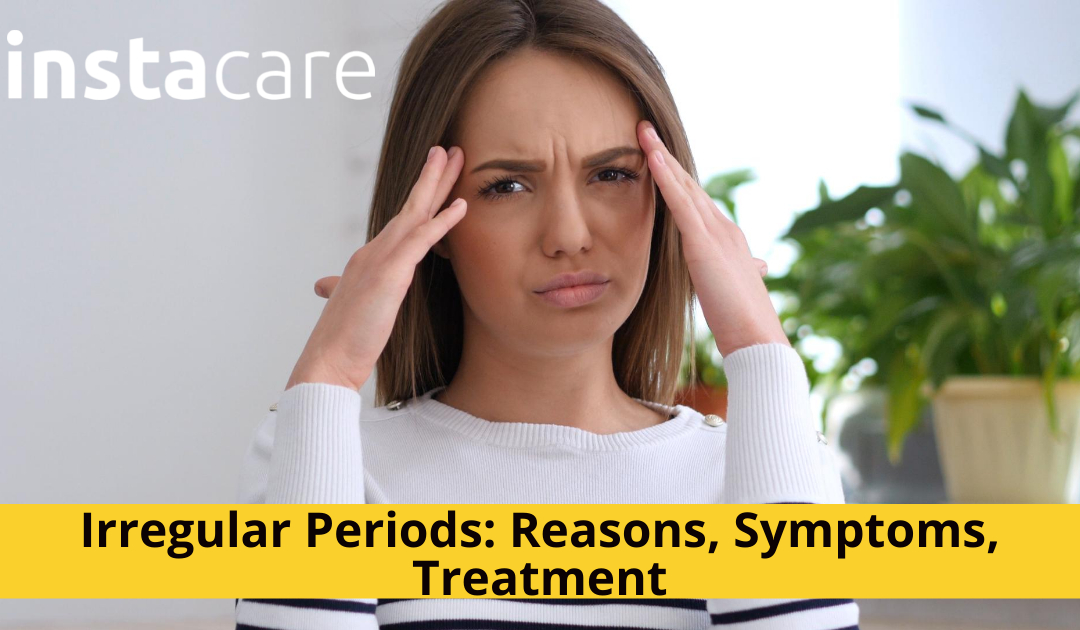Every woman is distinctive, including her menstrual cycle. Some things happen in a predictable pattern. Others are hit-or-miss and surprisingly unpredictable. A woman's period occurs every 24 to 38 days on average. Menstruation lasts typically between two and eight days.
What Are Irregular Periods
Irregular periods are changes to your usual menstrual cycle, or a menstrual cycle that varies from month to month is irregular.
Medical issues or lifestyle factors can cause period irregularities. Hormonal birth control, over-exercising, polycystic ovarian syndrome (PCOS), stress, and nursing are common reasons. Your healthcare professional can assist you in determining the cause of your irregular periods and the best treatment plan for you.
Irregular Periods Reasons
Here are some reasons for the irregular periods:
Perimenopause And Menopause
Perimenopause and menopause are two stages of the menopause process.
The natural fall in estrogen levels that leads to menopause is known as perimenopause. After a year without a menstrual period, you achieve menopause. For most women, this transition begins in their 40s and lasts about four years.
Menstrual abnormalities and ovulation are two early indicators of perimenopause. Hot flashes, lethargy, vaginal dryness, insomnia, and mood swings are some of the other signs and symptoms of menopause.
Intrauterine Device (IUD)
IUDs are a type of birth control that involves inserting a device into the uterus. Less frequent and lighter periods are a common side effect of hormonal IUDs.
Some Birth Pills
Many birth control pills have estrogen and progestin, and the drugs work by stopping the ovaries from generating eggs and preventing pregnancy. Taking or not taking birth control tablets can have an impact on menstruation. After stopping birth control tablets, some women experience irregular or skipped periods for up to six months. This is a critical issue to consider regarding conception and pregnancy. Women who take progestin-only birth control tablets may experience bleeding between periods.
Premature Ovarian Failure
Premature ovarian failure can because a woman to stop having her period before the age of 40, which can produce irregular periods or complete cessation of menstruation. In the case of a woman with cancer, this can be caused by radiation, surgery, or chemotherapy.
View More: How To Prevent Miscarriage?
Polycystic Ovary Syndrome
According to research, PCOS affects roughly 87 per cent of women who have irregular periods. PCOS is a hormonal disorder that causes irregular menstrual periods, increased androgen hormones, and ovarian cysts in women.
Breast-Feeding
Depending on how regularly you nurse, breastfeeding can cause your period to be suppressed. If your infant is helping exclusively, you may have a period while breastfeeding and then not have another for several months or more. You can ovulate before you get your period, so if you don't want to get pregnant, take birth control at this time.
Hormonal Change
Hormonal changes might also cause missed periods. Polycystic ovarian syndrome, pituitary tumours, and thyroid diseases are the most common causes of hormone abnormalities.
Some Other Reasons Can Be
- Pregnancy
- Weight-loss
- Uterine polyps
- Uterine fibroids
- Eating disorders like anorexia and bulimia
- Stress or emotional problems
- Travel
- Over-exercising
Irregular Periods Symptoms
The following are symptoms of an irregular period:
- Bleeding in the intervals between periods
- Variations in cycle length
- Between intervals of more than 35 days
- Changes the amount of time you spend on your periods
- The period that is heavier or lighter than usual
- Your period is missing
View More: Tips to Cope With Stuttering
Treatment Of Irregular Periods
You can treat your irregular periods by applying the followings rules in your life:
- Allow a few months for your body to adjust if you recently switched to hormonal birth control.
- Period alterations are caused by perimenopause or menopause, a natural condition. Medications and lifestyle modifications can help with other menopausal symptoms like hot flashes and vaginal dryness.
- Hormonal birth control may improve regularity by balancing hormonal issues caused by illnesses like PCOS.
- Weight loss may aid in the relief of PCOS symptoms.
- Other lifestyle modifications, such as stress management, focusing on moderate-intensity workouts, and getting enough sleep, may help promote more regular periods.
Conclusion
With certain lifestyle adjustments and home remedies, you might be able to get your menstrual cycle back on schedule. However, scientific evidence is scarce, and only a few natural therapies have been scientifically shown to control your menstrual cycle. Consult your doctor if you're concerned about your irregular periods.
Please book an appointment with the best Gynecologist in Lahore, Karachi, Islamabad, and all major cities of Pakistan through InstaCare, or call our helpline at 03100002273 to find the verified doctor for your disease.
Source: https://instacare.pk/blog/irregular-periods-reasons-symptoms-treatment












